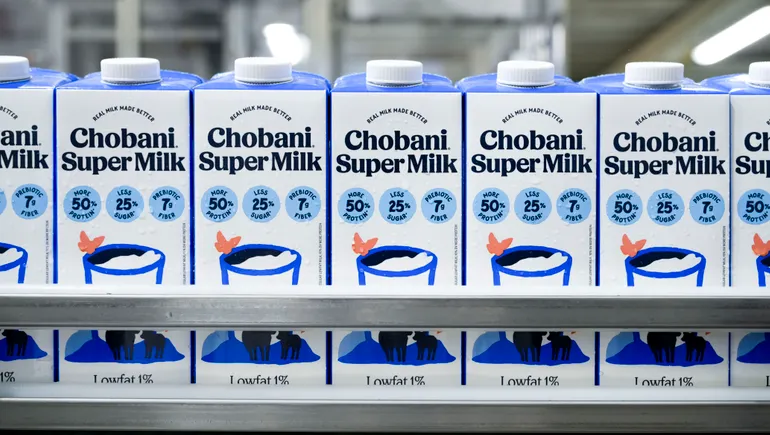Listen to the article 3 minutes This audio is automatically generated, please let us know if you have any feedback.
Chobani is launching its first shelf-stable, low-fat dairy product, which will be donated to people affected by natural disasters and food insecurity.
The product, called Chobani SuperMilk, can be stored for up to nine months without refrigeration. The food and beverage company plans to initially produce an average of 145,000 pounds of Chobani SuperMilk each month to be distributed to local food banks and food pantries in Central New York and Southern Idaho via the American Red Cross.
Dairy is one of the top five most requested foods among relief networks because it’s nutritious and rich in protein, Chobani’s vice president of impact Becca Dittrich said in an interview. But because dairy needs to be refrigerated, it can be difficult to donate to disaster areas if there’s a power outage or if local food pantries are in places with limited refrigeration capacity.
“Shelf-stable dairy products open up a whole new world of possibilities,” Dittrich says. “We’ve created a product that fills a need that’s really hard to fill in any other way.”
Chobani will only donate its products and “never” sell them in stores that typically sell its other products, she added.
Privately held Chobani is best known for its popular Greek yogurt, but a key pillar of the 19-year-old company is its focus on outside causes, such as making food a “force for good.” The idea for SuperMilk was born in the aftermath of last year’s deadly earthquake in Turkey, where Chobani founder and CEO Hamdi Ulukaya is from.
With storms, wildfires and famine affecting tens of millions of people each year, demand for nutritious, shelf-stable milk will continue and may even increase. Chobani pointed to its recent donation of SuperMilk to residents facing wildfires in New Mexico as an example of how the product can help those in need or at risk.
Chobani developed, marketed and manufactured SuperMilk, Dittrich said, which required the dairy company to focus resources that would have been put into revenue-generating products. Scientists spent time developing the product, and salespeople spent time designing the label. Chobani also temporarily shifted production of oat milk to making SuperMilk.
“Based on everything we’ve seen, this is a really unique endeavor,” she said. “It aims to be a proving point for what can be done by taking the knowledge, expertise, logistics, access to specific equipment and resources, and skills that companies have and using them to disrupt problems, whether that be in industry or in the social environment.”
Chobani says SuperMilk contains better nutrition than conventional milk: 50% more protein, 25% less sugar and a quarter more calcium. The product also contains prebiotic fiber for digestive health and is fortified with vitamins A and D.


